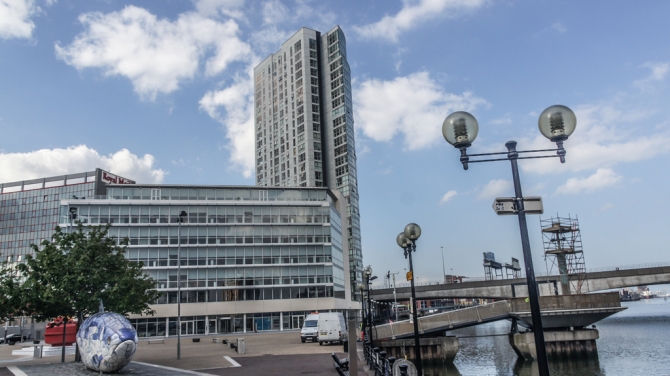Belfast’s Obel tower — the tallest building in Ireland — has been sold for more than £20m. Part of a mixed-use development, it is thought that as many as 15 individuals and institutions had posted bids for the Donegall Quay site.

The exact sale price is not being released, nor is the name of the new owner, but it is known there were only four bids “significantly more” than the £20m guide price. Marketed by Savills Northern Ireland, the 280ft tower and its adjacent buildings are strongly believed to now be in the hands of “a large US company with international credentials”.
“We expected the Obel to generate significant interest when we brought it to the market and that is exactly what transpired,” commented Savills’ director of investments, Ben Turtle. “It has taken just over a month for the sale to complete, which highlights the growing popularity of Belfast and Northern Ireland as a location for property investment.”
The sale is yet another episode in the project’s troubled history. Work started on the site in 2006 during the dying days of Ireland’s property boom. After several hold-ups the development was finally completed in 2011 at a cost of £60m, with the Obel tower taking the title of Ireland’s tallest building from Belfast’s high-rise office block Windsor House. Less than a year later its developers, Donegall Quay Ltd, went into administration owing the Bank of Scotland almost £48m.
Expected to produce an income of almost £2.5m when renovated and fully tenanted — many of its apartments are still empty after the crash — the Obel development is made up of three separate blocks: Obel 62 is a 28-storey residential tower containing 233 luxury flats, Obel 64 is an eight-storey residential block with 49 apartments, and Obel 68 is a seven-storey commercial block of 52,462sq ft Grade A office accommodation. The majority of the office space is occupied long-term by the international law firm Allen & Overy.
David Jones is a property partner with the legal firm of Tughans which, he explained, “has worked on behalf of funders Bank of Scotland from the development stage of the Obel building in 2008, through administration with KPMG in 2012, and more recently in the competitive tender process to identify potential buyers.” In all there had been 25 interested parties, although only 15 had placed offers.
Of the dozen or so unsuccessful bidders Savills hopes many will continue to search for properties in the Province. “Investment property transactions in Northern Ireland reached £175m last year, more than the combined total of transactions since the start of the downturn. However, with economic conditions improving, and investor confidence in Northern Ireland rising, we expect the figure to be much higher this year,” said Turtle.